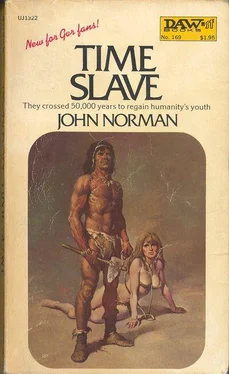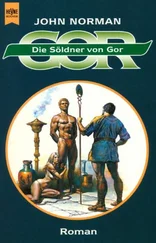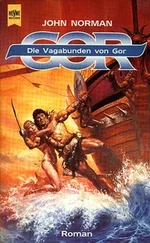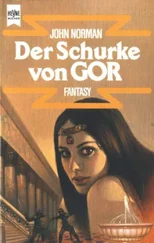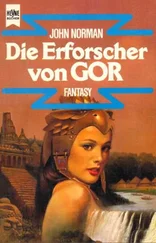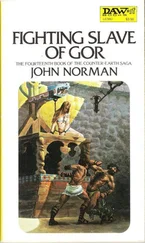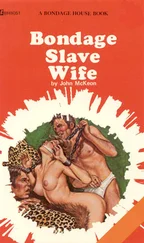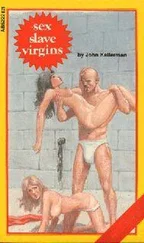Hamilton, with Cloud and Butterfly, struggled through brush about the camp.
“Cricket!” Hamilton called.
The berries were only stains and pulp in her clenched fist. She could hear others, too, the women, and Tooth, calling out, elsewhere in the brush.
Then she heard Tooth call out to her. “Turtle!” he cried. She, with the others, struggled through the brush, towards him. Ugly Girl, on her hands and knees, looked up at them. She looked frightened, sick.
“What is wrong?” whispered Hamilton.
“She has found the trail,” said Tooth.
Ugly Girl could not tell in the language of the Men the mingled scents she had detected, for her mouth and tongue could not make the words. But she did not sign the scents either, in hand talk. Tooth could not look Hamilton in the face.
“What is it!” cried Hamilton.
She saw a broken branch, a crushed leaf. “Cricket!” she cried. “Cricket!”
Ugly Girl, the others, and Tooth, did not follow her.
Hamilton made her way through the brush, pushing aside branches.
“He liked berries,” said Hamilton.
She placed, in the tiny trough, a dozen berries. They were large, juicy, red. She put in the tiny trough five tiny, pretty shells, and a toy, of stuffed leather, in the shape of a small, four-footed animal. Pod, who was the son of Short Leg, put a shiny pebble in the trough. Tree crouched nearby, but back with the others. He put a tiny bow, with tiny arrows in the trough. The Men put stones over the trough.
Hamilton stood up.
Short Leg, seeing her return, seeing her eyes, and that she knew, had leaped, eyes wild, terrified, to her feet and fled. “Turtle will kill me!” she cried to Stone. “Cricket is dead,” had said Stone. Short Leg fled to the cave where Spear sat, on a rug of fur. “Turtle will kill me!” she cried. “A child of the Men is dead,” said Spear. “Protect me!” cried Short Leg. “Are you here, Stone?” asked Spear. Prom the entrance to the shelter Stone had said, “I am here.” “With stones cut off her fingers,” said Spear. “With sticks punch out her eyes. Then take her into the forests. Leave her far from the shelters. Leave her far from the shelters at night.” “No,” cried Short Leg. She scrambled past Stone. On the ledge outside Spear’s shelter she saw Hamilton below. Hamilton began to climb toward her. “Turtle will kill me!” cried Short Leg. She picked up a rock and hurled it down toward Hamilton. Hamilton continued to climb toward her. Below, at the foot of the shelters, Short Leg saw Ugly Girl, Tooth, Cloud, the others. They were looking up, watching. “Protect me!” screamed Short Leg. “I am Short Leg!” she cried. “Protect me!”
Then Hamilton was on the ledge.
Short Leg turned to the cliff and, scrambling, hand by hand, feet scraping for holds, began to climb.
Hamilton followed her.
Some seventy or eighty feet from the stones below, clinging to the cliff, Short Leg turned her head, looked back, and, fingers scratching, sliding, lost her grip, and, screaming, plunged backward, falling, twisting, until she struck the stones.
At the foot of the cliffs Hamilton saw Pod, the infant of Short Leg. Suddenly screaming with hatred she seized the child and lifted it over her head, to dash its skull open against the cliffs, and then, sobbing, wild, Hamilton stumbled to Nurse, and thrust the child in her arms.
Hamilton rolled on the stones, striking at them, howling, shrieking at the sky in misery. She cut her body with the stones, and her tears and her blood marked the granite. In her right hand were the stains of the berries. Old Woman went alone into the forest and cut her face with rocks. With a flint knife she cut from her left hand two fingers.
Hamilton stood up. She looked down at the stones, covering the trough. All night Hamilton had sat with the child in her arms. By force Old Woman and Nurse had taken it from her arms, and placed it in the trough. Some articles, too, had been placed in the trough, some berries, some shells and a toy of stuffed leather. A child, too, had placed a pebble in the trough and one of the hunters had added a bow, a tiny one, with tiny arrows. Then the men had put stones over the trough.
Then Stone had said, “The meat must be roasted. There are skins to clean.”
The Men, followed by the women, and the children, turned away.
Hamilton, and Tree, remained behind.
“He liked berries,” Hamilton said.
Tree did not respond to her.
Hamilton took from her throat the necklace of the Men, unknotting it. She handed it to Tree. “I am going away,” she told him.
The hunter did not detain her.
“You are my daughter,” said Herjellsen.
“Do not excite him,” said William. “He is dying.”
“It has finally caught up with me,” said Herjellsen. “My own body. I am to be killed by my own body.”
“The child died,” said Hamilton. “It died. There is no child.”
“We have all failed,” said Herjellsen. “All of us have failed.”
Gunther, sitting on a wooden chair in the corner of the room, regarded him, not speaking. William sat near the bed, a stethoscope about his neck. In the background stood Herjellsen’s two blacks, the large fellow, who was called Chaka, though it was not his true name, but the name of a black king, and the smaller man, his friend. They wore khaki shorts and open shirts.
“Your scheme was a mad one,” said Gunther, slowly. “You are insane.”
Herjellsen looked at them, peering through the thick lenses of his glasses. He rested his head back. He sat in bed, propped by pillows. He was far thinner now, and whiter than Hamilton remembered him. His body seemed small beneath the sheets. He wore a ragged pair of red-striped pajamas. The neck was open. The first two buttons were opened. His face suddenly tensed, and his body was tight, clenched on a saw’s edge of pain.
“You should rest now,” said William.
“No,” said Herjellsen. Then he looked at Hamilton. “I had hoped,” he said, “there would have been a child.”
“It died,” said Hamilton.
“I am sorry,” said Herjellsen. Then he looked at her. “I chose you,” he said, “because you are my only daughter, my only child.”
Hamilton had not known her parents.
“It was essential to my hopes,” he said. “But now we have all failed.”
“What was it,” demanded Gunther, suddenly, angrily, “that you hoped to accomplish in your madness?”
“To inaugurate the renaissance of man,” said Herjellsen. “To touch the stars.” He lay back against the pillow, but his eyes were open. “Man,” he said, “has within him beasts and gods, and he is only truly man when each may thrive and both are fed.”
“On what,” asked Gunther, “can gods and beasts feed?”
“On meats and horizons,” said Herjellsen.
“The two natures of man?” asked William, smiling.
“No,” said Herjellsen, “that is the odd thing, for there is truly only one nature, though there is no name for it in any language I know. If there were to be a word, I suppose it would be the nature of the god-beast or beast-god. The important thing to understand is that it is the beast brain which thinks, which perceives, which acts. There is only one nature, that of the beast which can lift its head and catch the scent of the fires of stars.”
“Surely one nature or the other must die,” said William.
“No,” said Herjellsen, “that is the teaching only of those who have little of either nature.” He thrust his head forward. “If the god dies, so, too, does the beast, and if the beast dies, with it expires. the god. The heart may not be removed to succor the brain, nor the brain removed from the skull to pacify the heart. It is one system, one glory, one splendor, called Man.”
Читать дальше
